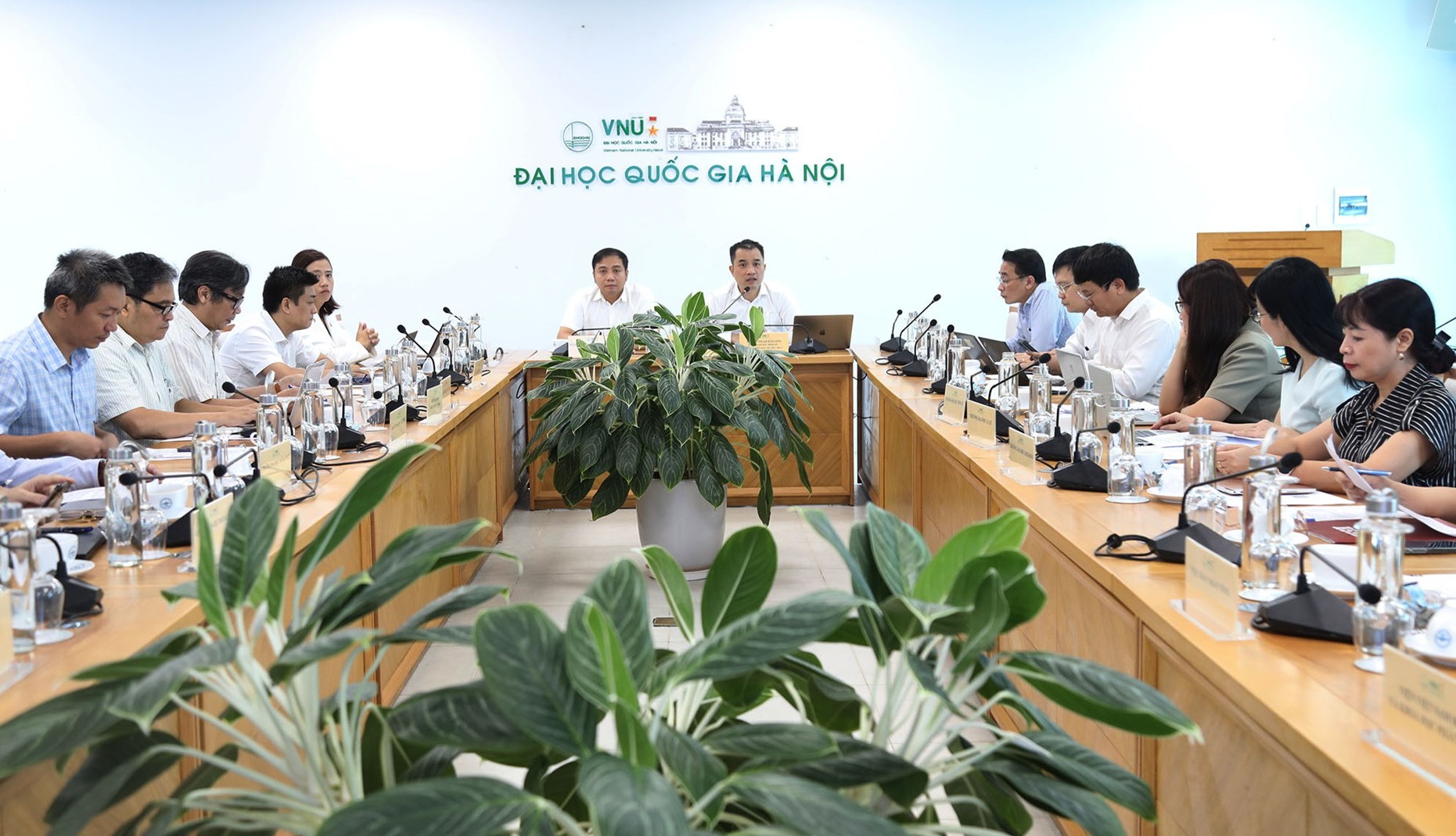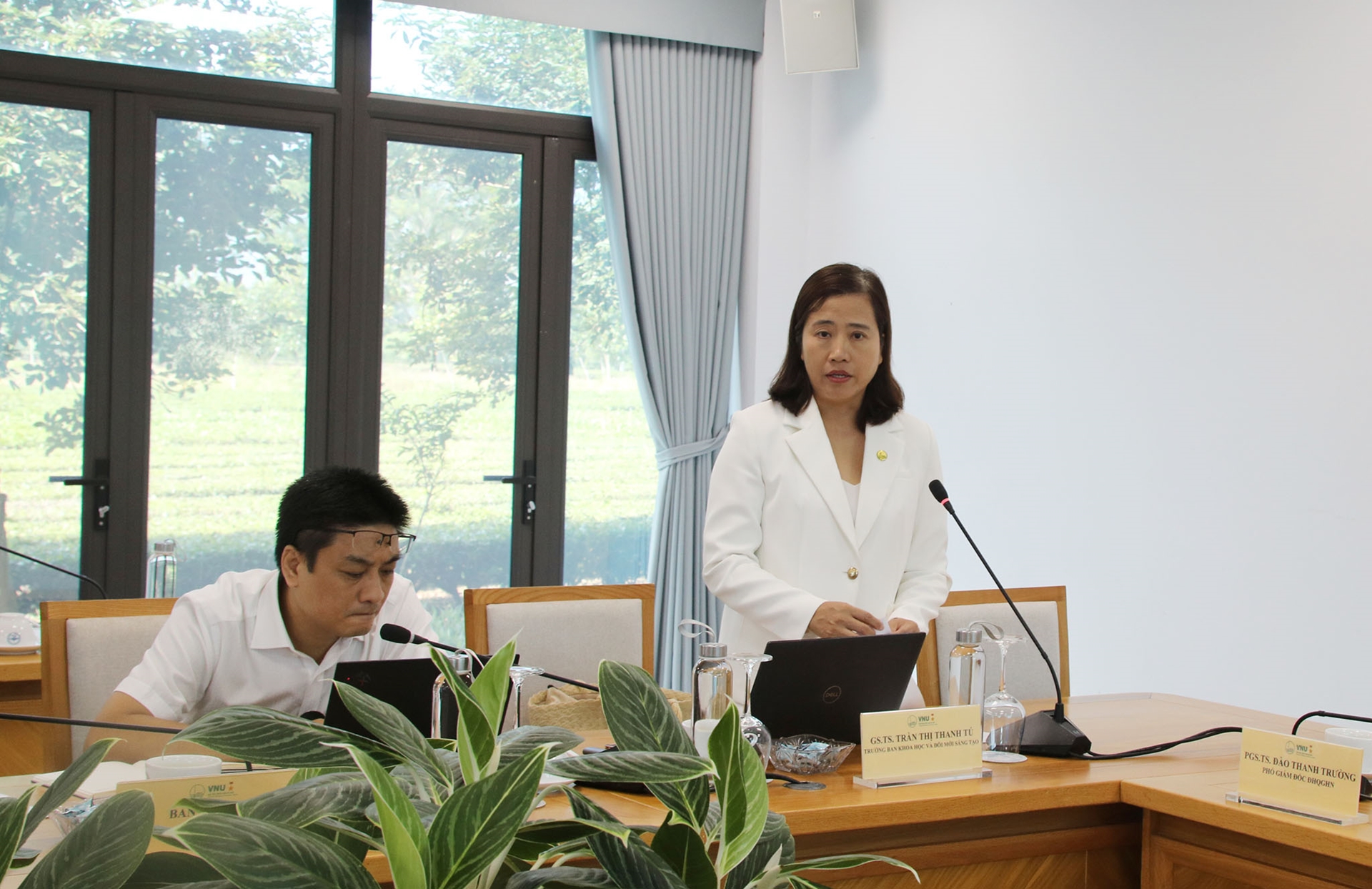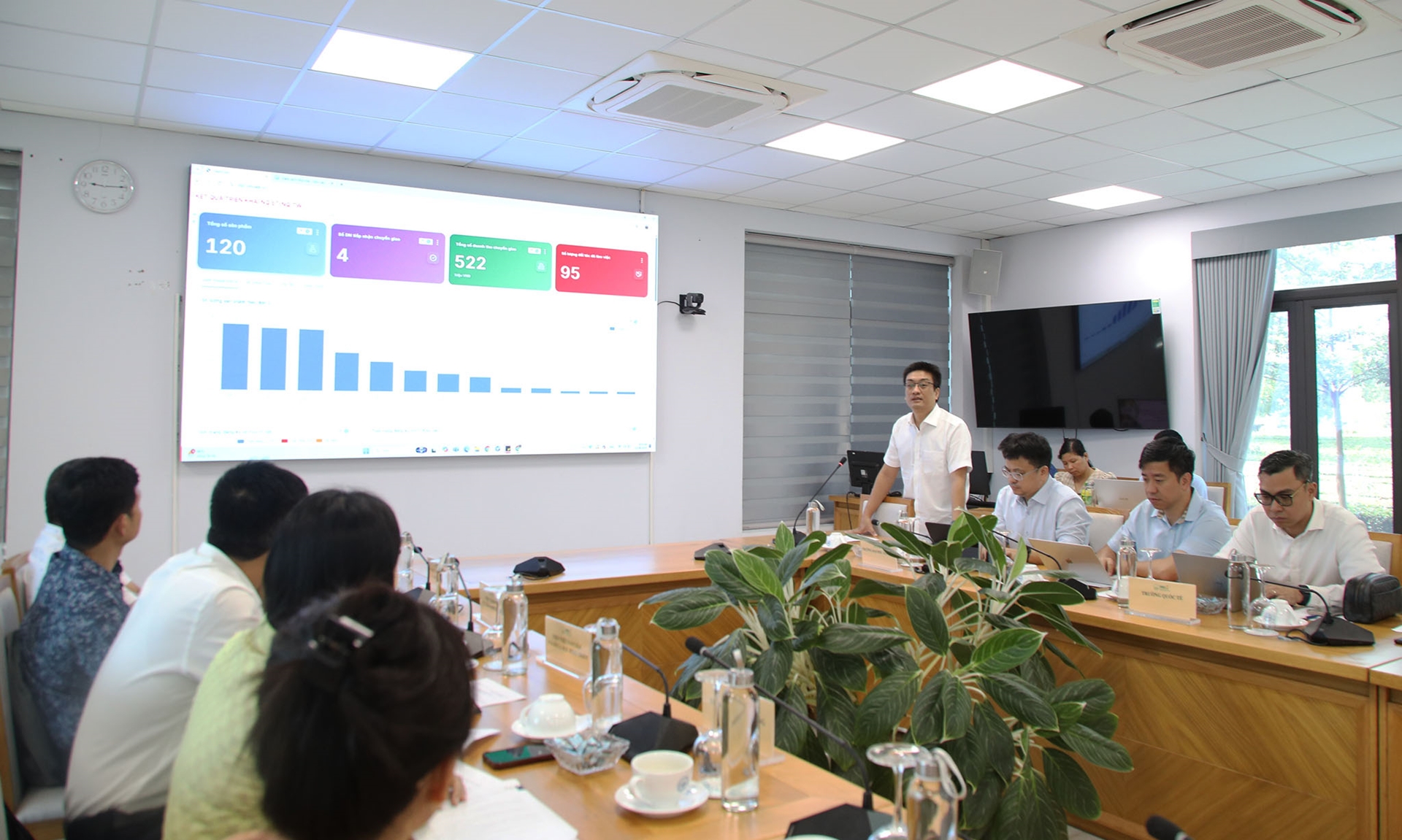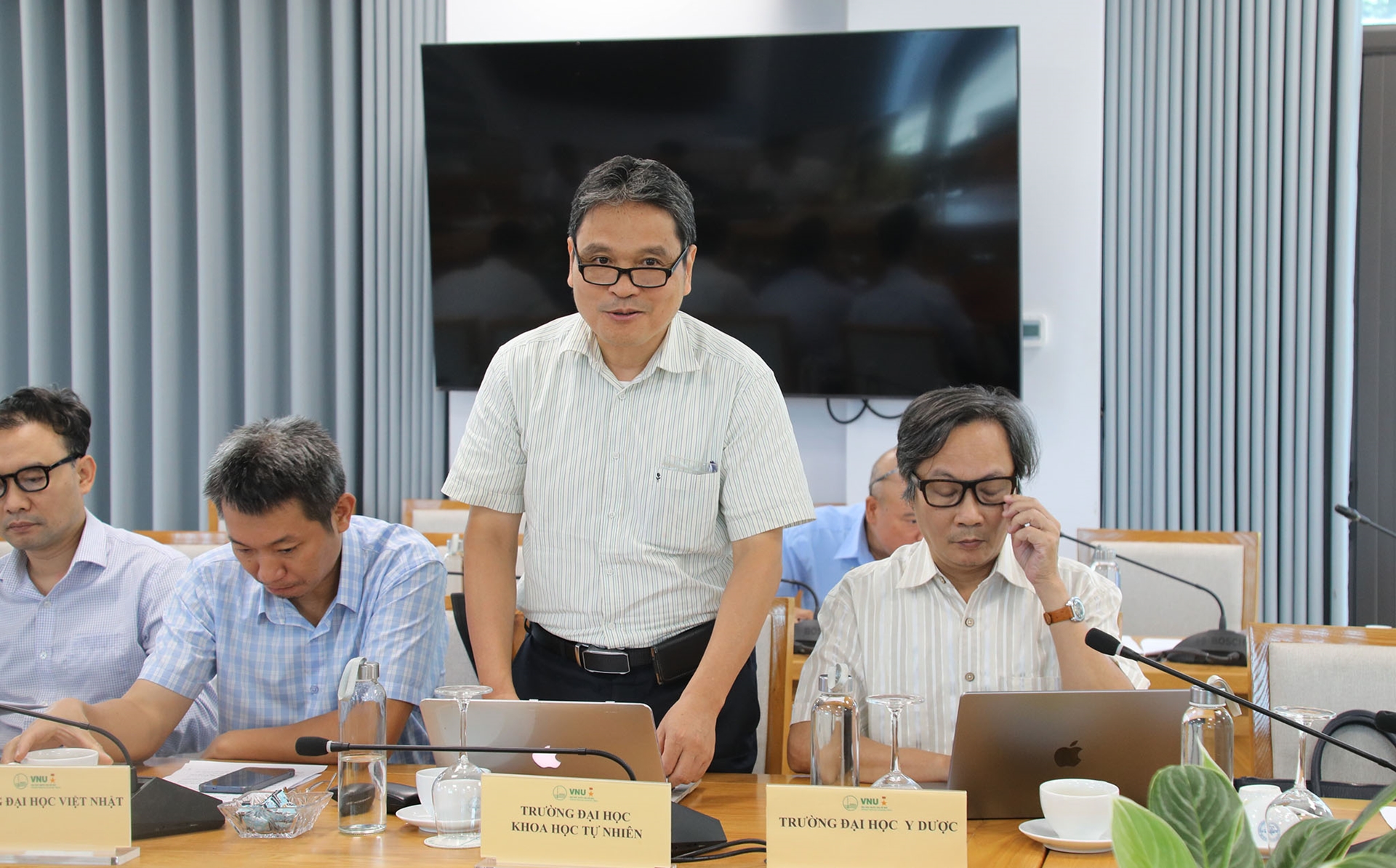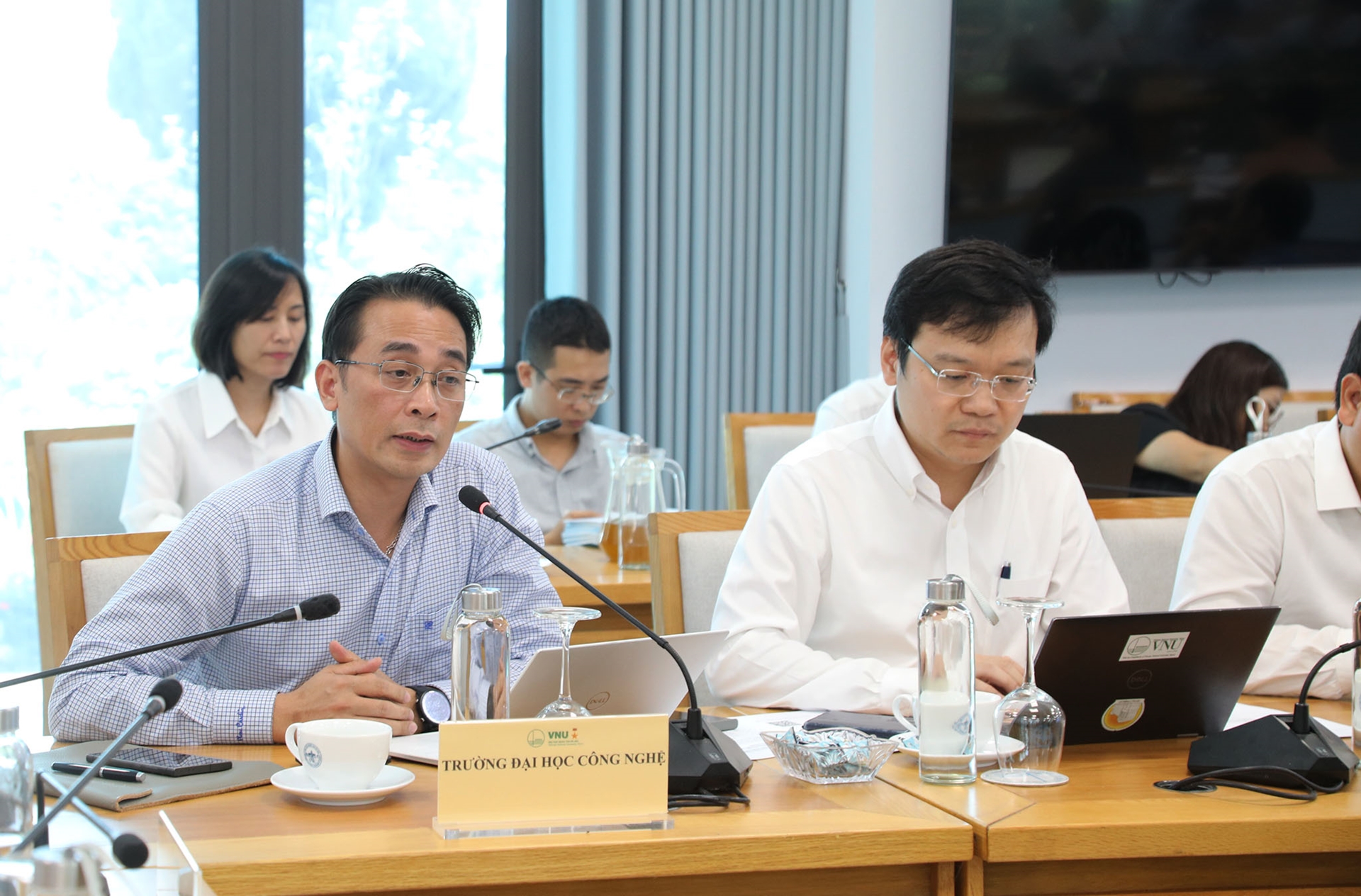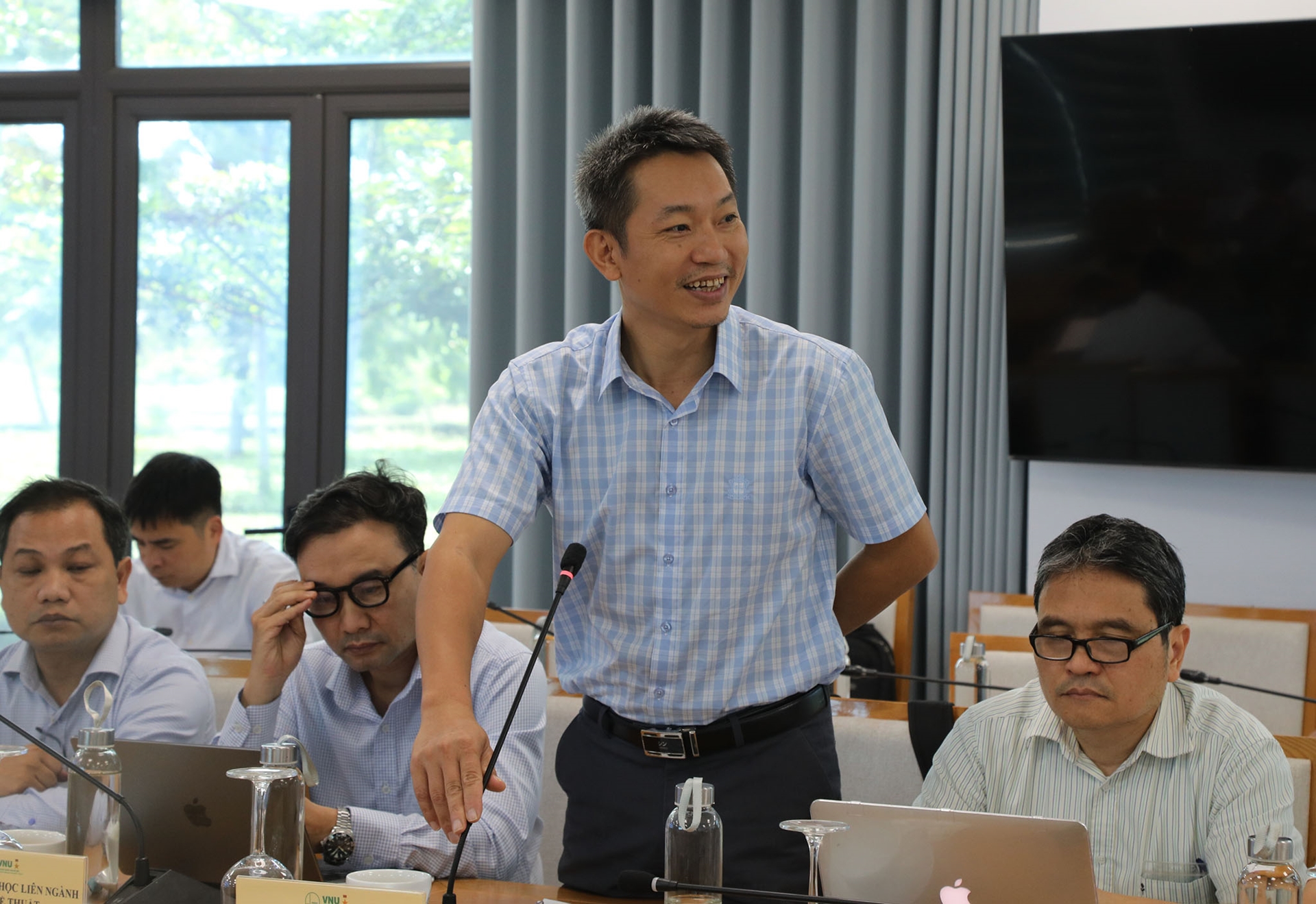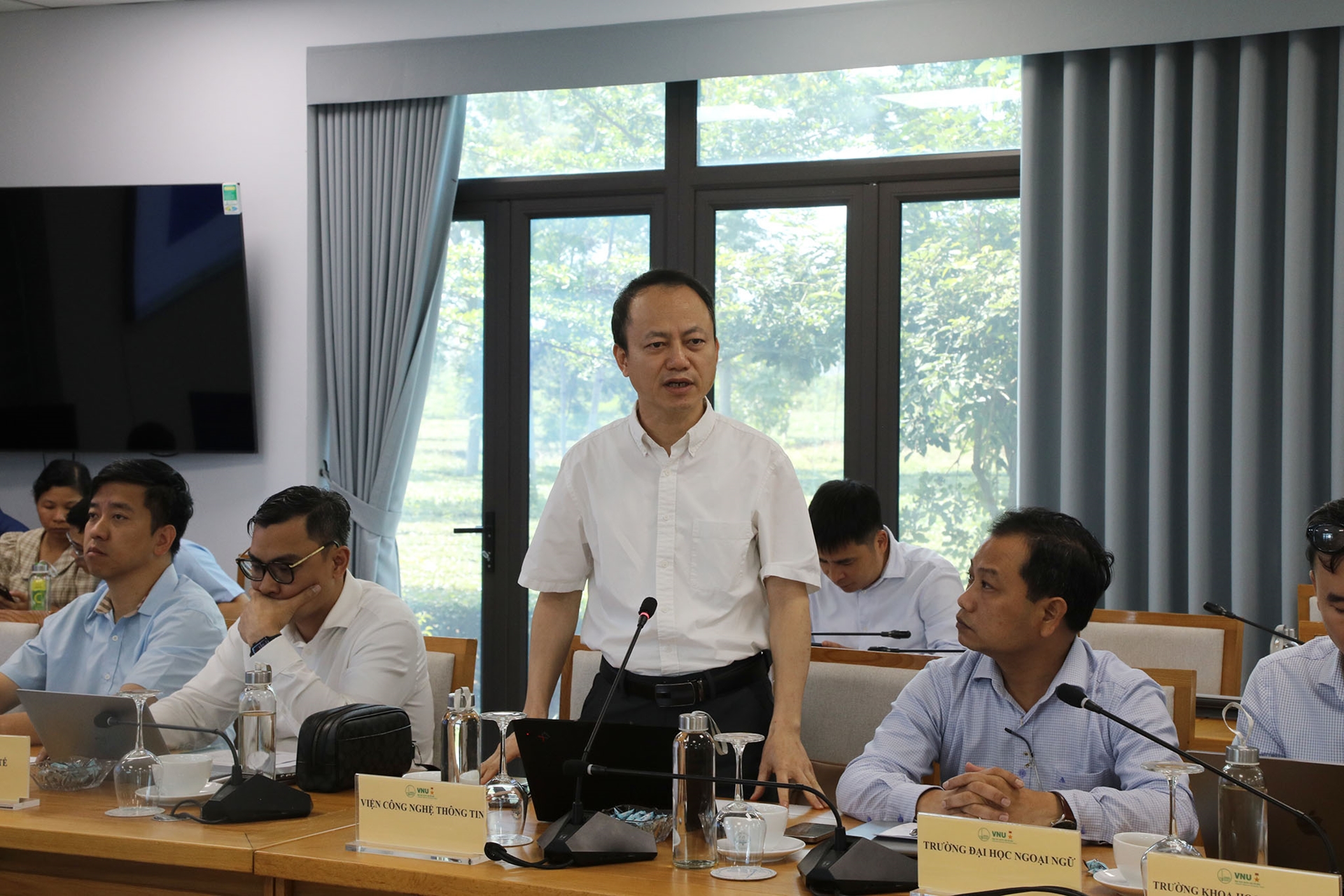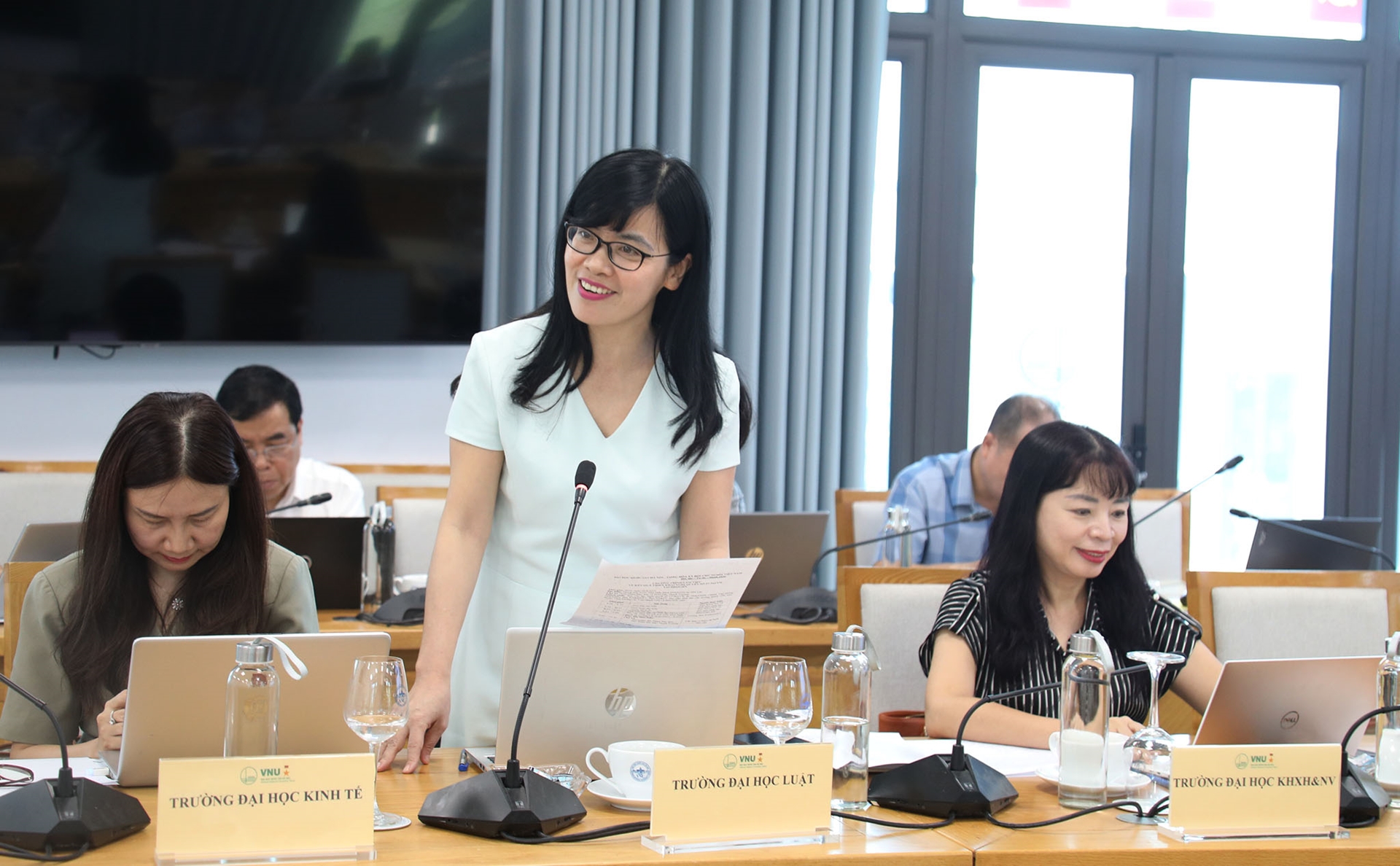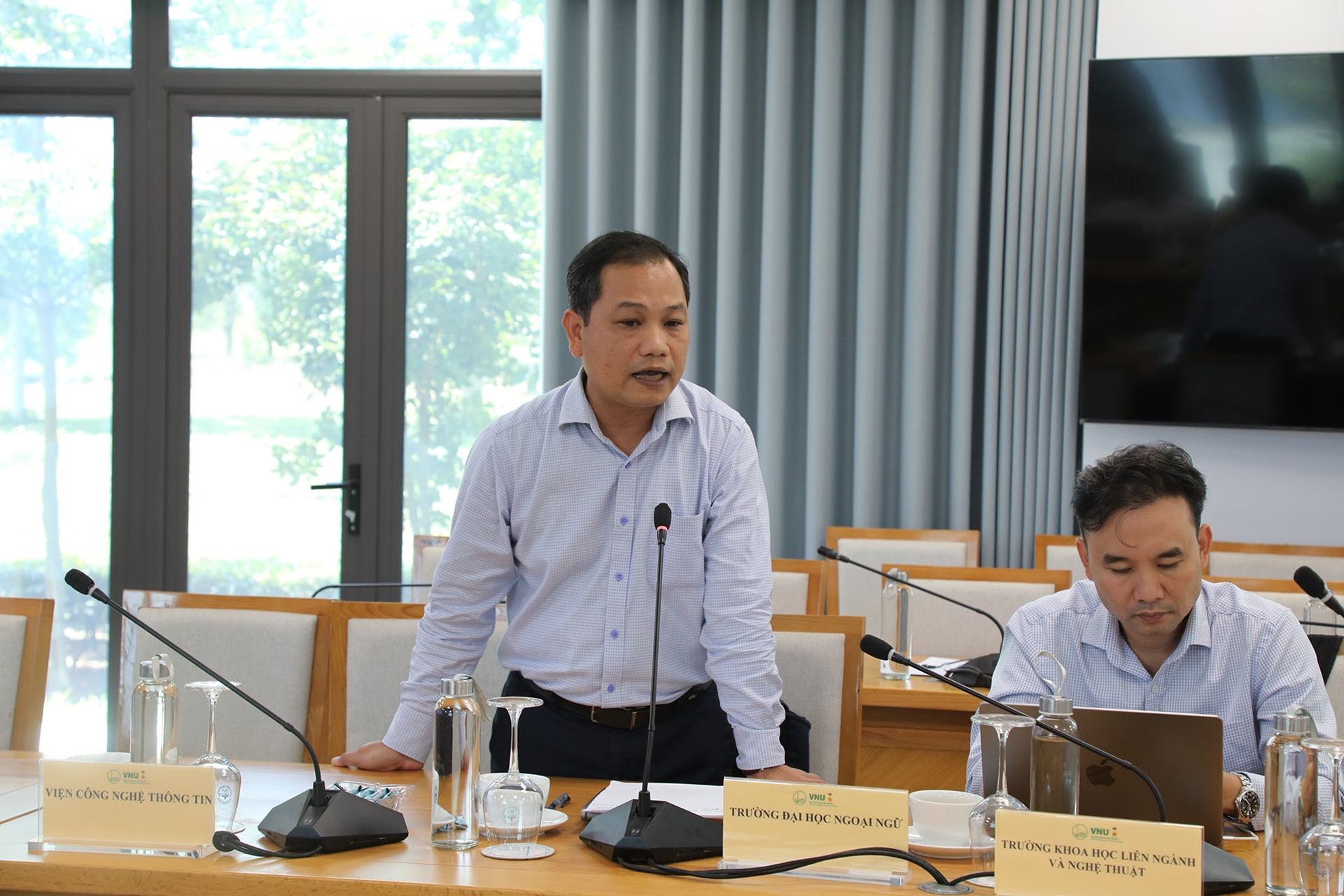The Vice-Directors of Vietnam National University, Hanoi, Pham Bao Son and Dao Thanh Truong co-chaired the working session. Also present were members of the Steering Committee for the implementation of Resolution No. 57-NQ/TW of the Politburo and Resolution No. 03/NQ-CP of the Government; and leaders of member universities, research institutes, and affiliated units of Vietnam National University, Hanoi.
Speaking at the meeting, Vice Director of VNU Hanoi Pham Bao Son emphasized that, in order to implement Resolution 57, VNU Hanoi has identified the focus of developing the "three-party" cooperation model, aiming to bring science and technology to serve businesses and localities and directly contribute to socio-economic development.
The Vice Director of Vietnam National University, Hanoi, stated that in the future, the reporting system will be closely linked to KPI indicators to evaluate the implementation results of Resolution No. 57-NQ/TW of the unit, with specific evidence regarding products, partners, and revenue from research transfer. From there, investment decisions, allocation of scientific tasks, and financial support will be clear, transparent, and highly effective.
Deputy Director Pham Bao Son suggested that, in the coming period, the implementation orientation should focus on research in strategic technologies, gathering ready-to-transfer products to seek partner businesses and expand cooperation with businesses, not limited to just one product but also including policy consulting, training, human resource development and laboratory investment.
Ms. Tran Thi Thanh Tu, Head of the Science & Innovation Committee, presented a report on the implementation of Resolution 57 at Vietnam National University, Hanoi during the first seven months of 2025.
Presenting the report on the implementation of Resolution 57-NQ/TW at Vietnam National University, Hanoi during the first seven months of 2025, Head of the Science & Innovation Committee Tran Thi Thanh Tu stated that Vietnam National University, Hanoi has achieved significant progress in many aspects, especially in key science and technology units.
Member and affiliated training and research units of Vietnam National University, Hanoi have expanded cooperation with major corporations such as Viettel, Samsung, FPT, VNPT, etc., creating a foundation for the transfer and commercialization of scientific and technological products and practices.
The Head of the Science & Innovation Committee further informed that, during the same period, intellectual property activities experienced strong growth. VNU recorded 62 inventions and utility solutions, achieving over 50% of the set target, with the University of Science and Technology and the University of Technology having outstanding achievements in the number of patents and intellectual property registrations. Regarding scientific publications, VNU as a whole has nearly 1,200 international articles in the WoS/Scopus system, of which 54% are in the Q1 and Q2 groups.
Policy consulting activities for central and local agencies also left their mark with 27 contracts, with the University of Economics alone implementing 8 national-level consulting contracts.
VNU also established three new research institutes in cutting-edge science and technology fields such as semiconductors, quantum computing, artificial intelligence, and sustainable development, while strengthening efforts to attract international experts, outstanding scientists, and hundreds of foreign students and scholars to study and conduct research.
To implement Resolution 57-NQ/TW more effectively, according to the Head of the Science & Innovation Committee, it is necessary to assign KPIs for implementing the Action Program under Decision No. 1345/QD-DHQGHN to units/unit heads, focusing on the indicators of the "three-party" model: number of products generating revenue, number of newly established businesses, amount of technology transfer/commercialization, amount of non-budgetary investment in R&D, etc.
Simultaneously, priority should be given to investing in key science and technology projects that generate products and revenue, and are linked with businesses right from the project formulation stage: focusing on 8 key areas as per Decision No. 3368-QD/VNU (Semiconductor chip technology; Artificial intelligence and big data (AI and Big Data); Robotics and automation technology; Advanced biomedical technology; Quantum technology; Advanced energy and materials technology; Smart agriculture; Environmental technology and sustainable development).
In addition, Vietnam National University, Hanoi (VNU) is promoting the development of an innovation ecosystem linked to businesses, expanding strategic cooperation with large corporations and enterprises such as Viettel, CT Group, VNPT, Samsung, FPT, BRG, MK Group, PVN… Along with that, it is vigorously implementing key science and technology programs: Semiconductor chips, Sustainable socio-economic development of coastal provinces, Applied mathematics, Synthetic biology, Applied Pelletron, Biodiversity, AI & cybersecurity…
Deputy Head of the Science & Innovation Committee Nguyen Ha Nam introduced the dashboard system developed by Vietnam National University, Hanoi, for the comprehensive compilation and statistical analysis of science and technology tasks implementing Resolution 57.
In particular, effectively implement the breakthrough policy on high-quality human resources – special mechanisms, interdisciplinary research groups, financial support… according to the projects of VNU and the Law on Science, Technology and Innovation.
Comprehensive digital transformation also needs to be prioritized, including the deployment of the OneVNU data portal, AI in university administration, research management, examinations, training, etc.
At the meeting, representatives from member and affiliated units shared initial results as well as difficulties and challenges in implementing Resolution 57-NQ/TW, and proposed solutions to promote cooperation among the "three stakeholders" and improve the effectiveness of commercializing science and technology products.
According to Tran Quoc Binh, Vice Rector of the University of Natural Sciences, the university has gathered about 100 potential products and nearly 30 intellectual property registrations, but determining which are outstanding products still depends heavily on practical needs.
Vice Rector of the University of Natural Sciences, Tran Quoc Binh, frankly acknowledged the pressure the university is facing in implementing Resolution 57-NQ/TW. He stated that the university has compiled approximately 100 potential products and nearly 30 intellectual property registrations, but determining which are truly outstanding products still depends heavily on practical needs. Major collaborations with businesses and localities, or consultations on disaster prevention and mitigation, all bring value but are difficult to quantify specifically.
Rector of the University of Technology, Chu Duc Trinh, affirmed that Resolution 57-NQ/TW is a direction consistent with the university's development strategy.
From the perspective of the University of Technology, Rector Chu Duc Trinh affirmed that Resolution 57-NQ/TW is a suitable orientation for the University's development strategy. Besides the task of training high-quality human resources, the University has promoted many research and technology transfer collaborations with state agencies and businesses, including projects with the National Digital Transformation Program Office, the Ministry of Public Security, as well as cooperation with Samsung, Viettel, VNPT, and many other technology companies. Short-term training for businesses is also considered a practical form of knowledge transfer.
Vice Rector of Vietnam-Japan University, Nguyen Hoang Oanh, shared the university's experience with research products that have entered the market, such as coffee, rice, and sustainable agricultural models.
Vice Rector of Vietnam-Japan University, Nguyen Hoang Oanh, shared the university's experience with research products that have entered the market, such as coffee, rice, and sustainable agricultural models. He stated that the biggest challenge is identifying and connecting these products to the university, as most are developed through direct collaboration between faculty and businesses. However, these products are being positively received by the community and demonstrate the commercialization potential of the young scientific team.
Vice Rector of the University of Medicine and Pharmacy, Nguyen Thanh Hai, affirmed the unit's strong determination in implementing Resolution 57-NQ/TW, while also highlighting the unique nature of scientific and technological activities closely linked to professional practice.
In the field of healthcare, Vice Rector of the University of Medicine and Pharmacy Nguyen Thanh Hai affirmed the institution's strong commitment to implementing Resolution 57-NQ/TW, while also highlighting the unique nature of scientific and technological activities closely linked to practical medical practice. He emphasized that most of the university's lecturers are leading experts in their fields, regularly participating in consultations, advising, and transferring medical technology, creating a significant impact on the entire system. The university has also established a spin-off enterprise. The university's research and international publication activities continue to yield good results, and may even exceed this year's KPI targets.
Director of the Institute of Information Technology, Tran Xuan Tu, focused on bringing research products closer to businesses.
The Director of the Institute of Information Technology, Tran Xuan Tu, focused on bringing research products closer to businesses. He stated that the Institute has had several important collaborations with FPT, Synopsys, and ARM, opening up opportunities to build a multi-billion VND laboratory in Hoa Lac and access valuable international data libraries for research and training. He suggested that the system displaying key performance indicators (KPIs) – the VNU dashboard – needs to be more flexible to accurately reflect actual operations. According to Mr. Tran Xuan Tu, every investment in infrastructure and strategic cooperation with businesses, even if it doesn't immediately produce a product, is a value that needs to be recorded and declared as a basis for subsequent investment decisions.
According to Nguyen Anh Thu, Vice Rector of the University of Economics, the institution has proactively and decisively implemented Resolution 57-NQ/TW by establishing a permanent working group and issuing a specialized resolution. The university considers innovation as a guiding principle in all its activities, from training and policy consulting to internationalization and building a startup ecosystem. In particular, policy consulting is conducted in a new direction: directly receiving proposals from central agencies to ensure feasible results with clear practical impact.
According to Vice Rector Dang Thi Thu Huong of the University of Social Sciences and Humanities, current research funding is concentrated on strong research groups, avoiding dispersion, and ensuring timely implementation of assigned scientific tasks. The university's strengths lie in policy consulting and international cooperation, with numerous projects in collaboration with international organizations and central ministries and agencies. The university leadership suggested that the Vietnam National University, Hanoi (VNU) should establish a mechanism to recognize and honor outstanding policy consultants, considering this as a measure of social impact on par with international publications.
According to Nguyen Hoang Anh, Vice Rector of the University of Law, the university currently possesses many outstanding products, including research on responsible governance rules and intellectual property research.
Vice Rector of the University of Law Nguyen Hoang Anh emphasized that the institution has established a Steering Committee for Resolution 57-NQ/TW and integrated science and technology orientations into the Party Committee's Resolution. The university currently possesses many outstanding products, including research on responsible governance principles and intellectual property. In addition, the university has also commissioned numerous policy advisory reports from ministries and agencies. The university leadership expressed a desire for a more flexible financial mechanism, especially in international cooperation, to facilitate the full exploitation of the potential of its legal experts.
According to Hoa Ngoc Son, Vice Rector of the University of Foreign Languages, the university is urgently finalizing a thematic resolution on science and technology to concretize Resolution 57-NQ/TW.
Vice Rector of the University of Foreign Languages, Hoa Ngoc Son, stated that the university is urgently finalizing a thematic resolution on science and technology to concretize Resolution 57-NQ/TW. In recent times, the university has achieved many outstanding results in organizing activities to support nationwide general foreign language education, creating a clear social impact in the context of promoting English as a second language. In addition, the university has also strengthened international cooperation with organizations such as the International Organization of Francophonie and many foreign businesses. The university leadership highly appreciates the significance of the dashboard system, considering it an important tool to promote transparency and monitor progress, and commits to fully updating activity information in accordance with the directives of the Vietnam National University, Hanoi.
Concluding the meeting, Vice Director of Vietnam National University, Hanoi, Pham Bao Son, once again emphasized the strategic directions aimed at deepening and achieving tangible results in the implementation of Resolution 57-NQ/TW. He stated that reporting and updating the system is not merely an administrative procedure, but more importantly, it is about building a comprehensive picture of the products, potential, and cooperation capabilities of the entire Vietnam National University, Hanoi. Based on this, the leadership will have a solid foundation to make strategic investment decisions, focusing on long-term products, key technologies, and research results ready for transfer to businesses.
He also affirmed that the "three-party" cooperation needs to be viewed comprehensively, encompassing everything from technology transfer, business orders, policy and strategy consulting, training, to laboratory investment agreements.
In the coming period, VNU will continue to improve and refine the reporting process, decentralizing data updates down to the faculty and research group level to reduce administrative procedures for units, while encouraging schools and institutes to proactively identify, respond to, and propose solutions to further improve the system.
Vice Director Pham Bao Son expressed his hope that Vietnam National University, Hanoi will establish a database system that accurately reflects its scientific and technological capabilities and potential, thereby creating a foundation for strong future development.
